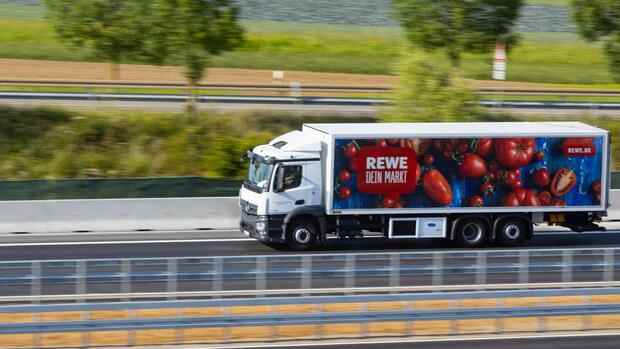Retail chains invest a lot of money in their logistics and require planning security.
(Photo: imago images/Arnulf Hettrich)
Berlin Numerous freight forwarders, trading companies and truck manufacturers are warning of a wave of insolvencies in view of the rising prices on the gas market. In a letter, the Federal Association of Road Haulage, Logistics and Disposal (BGL) drew the attention of Federal Minister of Economics Robert Habeck (Greens) to the problems of high gas prices.
It states: “Forwarding, transport and logistics companies that have switched to a large proportion or even completely to gas-powered trucks are immediately in existential difficulties, up to and including insolvency.” to set up a rescue package for entrepreneurs who are threatened with their existence”.
He also proposes opening up the “pandemic-related emergency measures of the federal government” to companies that operate more than half of their fleet with liquid gas LNG and are now on the brink of collapse. Alternatively, the companies advocate compensating for the difference between diesel and LNG prices as an “innovation surcharge”. This is currently around one euro per liter.
Transporters have switched to LNG trucks
According to BGL, companies have been investing more in LNG vehicles since 2020. They are currently the only alternative to diesel vehicles. “Drivers of the market ramp-up” were the “exemption from tolls until the end of 2023 and the competitive price of LNG until the summer of 2021”.
Top jobs of the day
Find the best jobs now and
be notified by email.
The next step should actually be the switch to Bio-LNG. According to the association, this will not happen if prices continue to rise. In view of the uncertain market situation, transport and logistics companies as well as biomethane producers shy away from future investments.
Due to increased prices on the gas market, companies are asking for help from the Federal Ministry of Economics.
(Photo: Reuters)
In addition to the vehicle manufacturers Iveco and Scania, the signatories to the letter also include retail groups such as Edeka and Netto, as well as freight forwarders such as Reinert Logistic. The company advertises with the slogan: “We go green.”
Additional costs in the seven-digit range every month in view of the sharp rise in gas prices
In the letter to Habeck, Reinert Logistic explains that more than 370 LNG vehicles and thus more than half of its fleet have been converted to the more climate-friendly fuel. More vehicles have been ordered. The additional costs in view of the sharp rise in gas prices would be in the seven-digit range every month.
In the letter, the association points out that a medium-sized company cannot cope with the additional costs over a longer period of time. And: “In addition to the liquidity, the burden on earnings is also enormous, which is very difficult for the future development of the company.”
A truck costs around 35,000 euros, around a quarter more than a conventional diesel vehicle. The vehicles are exempt from the toll, which corresponds to 18,700 euros for 100,000 kilometers.
Oliver Luksic (FDP), who is responsible for freight transport as parliamentary state secretary in the Federal Ministry of Transport, gave little hope for help. When asked, he stated that he was “in coordination” with the Ministry of Economic Affairs responsible for economic aid. At the same time, Luksic pointed out that the federal government promotes LNG “through a reduced energy tax rate and the ongoing toll exemption, as well as indirectly through its relative competitiveness in fuel emissions trading”.
Automobile Association calls for lower energy prices
Hildegard Müller, President of the German Association of the Automotive Industry (VDA), emphasized that “a lot has already been invested”. Especially with a view to the confrontation between Russia and Ukraine, she demanded: “Politicians must keep an eye on energy prices and availability.”
Basically, she advocated that the market should decide which technology will prevail – and not political guidelines. When setting up a charging infrastructure network along the motorways, it is important to “think about heavy goods traffic right away”.
The VDA President calls on politicians to keep an eye on energy prices.
(Photo: dpa)
In addition to sufficient charging infrastructure, medium-sized companies are primarily demanding clarity with regard to funding programs. The Mittelstandsverband ZVG addressed corresponding concerns to Economics Minister Habeck and Transport Minister Volker Wissing (FDP). It has been announced that the existing subsidies for e-cars will expire at the end of the year. The future purchase premium is still unknown.
According to CEO Ludwig Veltmann, some member companies have already put all ambitions in the direction of e-mobility on hold for the time being. “Aggravated by the limited ability of the industry to deliver, some companies are already considering gearing their fleets, which are in urgent need of renewal, to fossil fuels such as diesel.”
Medium-sized companies warn of funding chaos
According to its own statements, the association represents 45 sectors and more than 230,000 medium-sized companies from trade, crafts and services, which organize themselves in association groups such as Edeka, Rewe, Expert or Euronic. According to the association, the companies together have a turnover of half a billion euros and invest five to ten percent in their logistics.
So it’s about 25 to 50 billion euros. “We want a goal-oriented policy,” Veltmann told the Handelsblatt. There are too many different funding programs that together form a veritable “jungle”. The companies wanted to know whether they should invest in e-mobility, hybrids or hydrogen. “The funding programs must be long-term and reliable.”
Veltmann warned against chaos like with the KfW program for the construction of energy-efficient buildings. Habeck had stopped the KfW 55 program in January, which greatly unsettled investors. “We must not experience a second case of KfW.”
More: Solid figures, cautious forecast: The new Bosch boss is keeping surprises open
